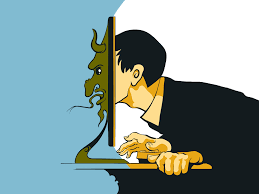Type-No-Evil-Understanding-The-Behaviour-And-Impact-Of-Trolls-by-Dr-Michelle-Hunter-Hill
Posted on

Understanding Online Trolling: Psychological Profiles, Impact, and Strategies for Mitigation
In an era where digital engagement has become an integral part of everyday life, online trolling has emerged as a pervasive and harmful phenomenon. Far from the whimsical folklore of trolls lurking beneath bridges, contemporary internet trolls occupy social media platforms with the intention of inciting conflict, spreading hostility, and inflicting psychological harm on their victims (Forbes, 2020). This behaviour, fuelled by anonymity and a lack of accountability, warrants an in-depth analysis of the psychological makeup of trolls, the impact on their victims, and the necessary systemic responses to mitigate the consequences of such behaviour.
The Anatomy of a Troll: Unveiling the Dark Tetrad
Extensive research into the personality traits of trolls consistently reveals a disturbing psychological profile. Predominantly, trolls exhibit characteristics aligned with the “Dark Tetrad” — a cluster of malevolent traits comprising narcissism, Machiavellianism, psychopathy, and sadism (Paulhus & Williams, 2002; Jones & Paulhus, 2011; Vaillancourt & Arnocky, 2019). Narcissism fuels a sense of superiority and entitlement, Machiavellianism underpins manipulative and deceitful behaviour, psychopathy drives callousness and lack of empathy, while sadism — perhaps the most telling trait — denotes deriving pleasure from the suffering of others.
Crucially, recent studies (Vaillancourt & Arnocky, 2019) suggest that sadism, when paired with high self-esteem, creates an amplified propensity for trolling behaviour. This contradicts the common assumption that low self-esteem underpins bullying tendencies; rather, trolls with a sadistic inclination and inflated self-worth find gratification in witnessing the emotional pain they cause.
The Psychological Toll: Varied Victim Responses
The impact of trolling on victims is complex and multifaceted. While some individuals exhibit resilience, many experience profound psychological distress, including depression, anxiety, reduced self-esteem, and feelings of helplessness. The insidious nature of online bullying — often persistent and boundary-less — compounds this harm. Unlike in-person bullying, digital harassment can infiltrate victims' personal spaces at any time, creating a perpetual sense of vulnerability and fear.
Moreover, the anonymity afforded to trolls heightens their power. Shielded by pseudonyms and fake profiles, trolls evade accountability, rendering victims powerless to identify or confront their aggressors. This anonymity fosters the 'online disinhibition effect' — a psychological phenomenon wherein individuals feel emboldened to act in ways they would avoid in face-to-face interactions, driven by a perceived detachment from their actions and consequences (Suler, 2004).
Systemic Accountability: The Role of Platforms and Legislation
While victims are frequently advised to take proactive steps to mitigate the impact of trolling, this places undue responsibility on those already suffering. The systemic failure of social media platforms to prevent and penalise trolling exacerbates the issue. The recently proposed Online Safety Bill represents a pivotal attempt to hold technology companies accountable, imposing a legal duty of care to protect users from harmful content — a move monitored by Ofcom, the UK’s communications regulator. However, the efficacy of such legislation remains to be seen, and enforcement will be crucial in determining its success.
Strategic Responses: Empowering Individuals and Organisations
In addition to systemic changes, individuals and organisations must be equipped with practical strategies to counter trolling behaviour:
- Refrain from Engaging: Engaging with trolls reinforces their behaviour. Withholding emotional responses deprives them of the satisfaction they seek.
- Seek Support: Victims benefit from social support networks, whether through friends, family, or professional counselling.
- Document and Report: Keeping a record of trolling incidents aids in reporting to social media platforms and law enforcement.
- Resilience Training: Organisations can foster resilience among their members through psychological fitness assessments, coaching, and tailored aftercare services.
- Promote Awareness: Organisations must recognise trolling as a legitimate mental health threat and implement educational campaigns to de-stigmatise victimisation and encourage reporting.
Conclusion: Reframing Trolling as a Public Mental Health Concern
The rise of online trolling underscores a critical need to dismantle the narrative that digital abuse is trivial or inconsequential. By leveraging psychological research, promoting systemic accountability, and empowering individuals with effective coping mechanisms, society can work toward reducing the prevalence of trolling and mitigating its psychological toll. A collective, multi-layered approach — spanning individuals, organisations, technology platforms, and legislation — is essential to fostering safer, more compassionate digital environments.
The onus should no longer rest solely on victims to endure or resist trolling; rather, the digital community as a whole must acknowledge and confront this destructive behaviour with empathy, resilience, and accountability.
Disclaimer: The content generated on this blog is for information purposes only. This Article gives the views and opinions of the authors.
Dr Michelle Hunter-Hill is a Chartered Psychologist, Behavioural Scientist and Coach who specialises in advising on trolling, and the psychological safety of workers/contributors in various occupational settings (offices, remote-working, on screen, on track/field/pitch). Dr Hunter-Hill creates psychometric profiles (assessments) of trolls/digital bullies, and deviant types such as narcissistic leaders, extreme risk takers and more. Dr Hunter-Hill runs the Issues@Work Clinic, and The Psychometrics Cafe’. Dr Hunter-Hill is Director of the MSc Occupational and Business Psychology programme at University of Roehampton.

Add a comment: